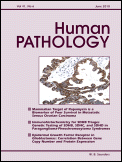
Celiac.com 05/18/2010 - A research team recently concluded a clinicopathologic and array comparative genomic hybridization study on enteropathy-associated T-cell lymphoma.
The team included Young Hyeh Ko MD, PhD; Sivasundaram Karnan; Kyeong Mee Kim MD, PhD; Cheol Keun Park MD, PhD; Eun Suk Kang MD, PhD; Young Ho Kim MD, PhD; Won Ki Kang MD, PhD; Seok Jin Kim MD, PhD; Won Seog Kim MD, PhD; Woo Yong Lee MD, PhD; Ho Kyung Chune; Masao Seto MD, PhD.
Celiac.com Sponsor (A12):
The are associated variously with the Department of Pathology, the Department of Laboratory Medicine, the Division of Gastroenterology, Hemato-oncology of Internal Medicine, the Department of General Surgery of Samsung Medical Center at Sungkyunkwan University in Seoul, Korea and the Division of Molecular Medicine of the Aichi Cancer Center Research Institute in Nagoya, Japan.
The latest World Health Organization classification system recognizes 2 types of enteropathy-associated T-cell lymphoma. The first, EATL type 1, is strongly associated with celiac disease, and makes up most EATL cases in Western countries. The second, EATL type 2 has no associations with celiac disease.
To properly classify enteropathy-associated T-cell lymphoma types in Korea, the team conducted clinicopathologic and immunophenotypic analyses of 8 Koreans with enteropathy-associated T-cell lymphoma, and investigated genomic profile via array comparative genomic hybridization.
Five patients presented tumors in the small intestine, while three presented tumors in the colorectum. Two patients carried an HLA DQB1âŽ0302 allele that corresponds to HLA DQ8. None of the patients suffered gluten-sensitive malabsorption syndrome.
The team found intraepithelial lymphocytosis in all patients. In seven patients showed small, or small-to-medium, tumor cells. One patient presented with a medium-to-large tumor. Tumor cell immunophenotypes were CD4−CD8+CD56+ in 4 cases, CD4−CD8+CD56− in 1 case, CD4−CD8−CD56+ in 2 cases, and CD4−CD8−CD56− in 1 case.
Using array comparative genomic hybridization analysis to spot recurring genomic alterations, the team found chromosome 9q33-q34.1 gain in four of five patients, chromosome 6p21.1-21.31 gain in three of five (60%), chromosome 6p21.1-21.31 gain in three of five (60%), and chromosome 3p12.1-p12.2 and 3q26.31 loss in two out of five (40%).
These results show type 2 enteropathy-associated T-cell lymphoma to be the most prevalent type in this geographic region, and that associated genetic changes are similar to those in Western countries.
Source:
- Open Original Shared LinkOpen Original Shared Link






Recommended Comments
There are no comments to display.